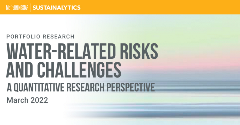Water-Related Risks and Challenges
This report sheds light on the growing effects of water scarcity on companies and countries. To address these challenges, investors can use water reporting metrics to identify companies and countries with severe water risk. We further relate water metrics to firm and country characteristics and highlight substantial cross-sectional differences.
ESG Beginner's Checklist: Action Items on Overcoming Common Obstacles
Discover some of the obstacles ESG leaders face in the early stages of their journey toward sustainability — and what you can about them—in this checklist. Is your company dealing with limited human resources, overwhelming ESG information, inconsistent communication with stakeholders, understanding the competitive landscape, or funding your ESG program?
Key Themes Shaping Proxy Voting in 2022
As the volume and breadth of ESG risk exposure continue to rise, the stage is set for another momentous proxy season. The trending topics of last year will continue to steer the agenda—with the prospect of even more substantial support from shareholders in 2022.
The Sustainability Conundrum of Living Income in Agriculture
Living Income is a crucial consideration among leading companies across some sectors and their supplier companies throughout the agricultural and food supply chain. Companies that manage ESG risk in their supply chains, making targeted investments to improve their resilience, are better positioned to build investor confidence.
Answering the Call for Progress: How Companies Can Respond to Investor Demands on DEI
In this blog post we share what companies can do to communicate their progress on diversity, equity, and inclusion (DEI) to investors and other key stakeholders, particularly with respect to gender diversity and advancing women’s socio-economic status.
EU Taxonomy in Limbo - Reporting Alignment of Article 8 and 9 Funds in 2022
For observers of the EU’s Sustainable Finance Strategy, 2022 kicked off with a crack and a bang as the European Commission went ahead with plans to include natural gas and nuclear-related activities as potentially sustainable under their ‘Green Taxonomy’. However, in midst of this furor, seemingly less attention has been paid to other components of the regulation that have quietly taken effect from the 1st of January 2022, presenting their own set of challenges.
The ESG Risks of National Oil Companies Taking Over Fossil Fuel Production from International Oil Majors
As growing pressure to cut GHG emissions is causing Western oil majors to sell their high-carbon assets, it is expected that National Oil Companies (NOCs) will pick up some of the production. For investors holding an interest in or considering investing in NOCs or sovereign debt, it is worth assessing how fossil fuel production shifts will impact their portfolio’s alignment with climate ambitions and ESG values.
What Happens When Companies are Receptive to Investor Feedback on ESG?
When companies are receptive to investor feedback, there are clear real-world impacts and positive changes. Such engagement outcomes vary and are directly tied to the company and its company-specific exposure to material ESG issues.
Q&A | Financing the Future: An Interview on How Banks are Embarking on Their ESG Journeys
Financing the Future: Conversations in Sustainable Finance is a Q&A series where we sit down with featured ESG experts from Sustainalytics, sharing their insights on how businesses are using finance to meet the challenges of our transition to a sustainable future.
Maximum Impact: How Bond Impact Reporting Can Improve Corporate Decision Making
When companies measure and report the environmental and social impacts of their operations, they can demonstrate to investors large and small that their green and social bonds are reliable investments for maximum impact. Then investors can optimize their portfolios for impact as they do for risk and reward and companies can optimize their efforts to improve.
Measuring What Matters: Initiatives for Banks' Climate-Related Impact and Disclosure
To help financial institutions examining the climate impact of their portfolios, we’ve compiled a list of the initiatives and organizations offering guidance on the collection, measurement, and disclosure of climate-related financial data.



















